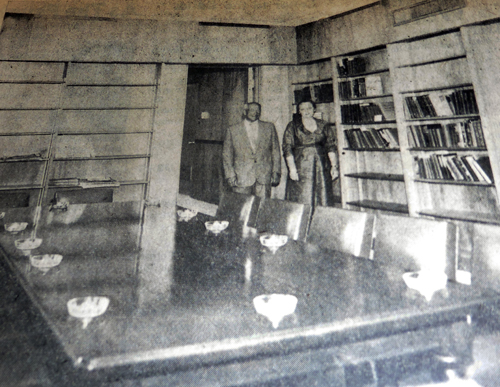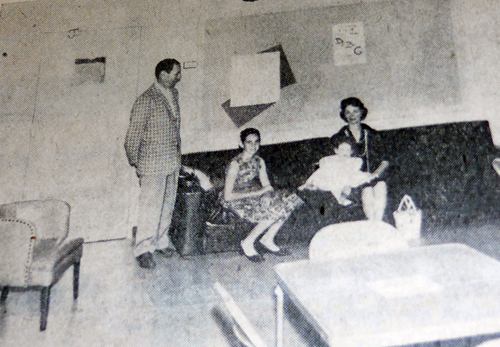Religious Viewpoint on “Right to Work”: The Protestant View
Southwestern Jewish Press, May 16, 1958, Page 3
Rev. Andrew Juvinall, Pastor, First Methodist Church, Napa
As Christians we are concerned with the spiritual and material well-being of our fellowmen. According to Jesus the decisive factor in God’s judgment of a man is the extent to which he serves his brother who is in need of food, shelter, or clothing. All so-called “right to work” laws strike at man’s right to work under just conditions. When in a secret election conducted by the Federal government the majority of employees of a given industry choose to have a certain union represent them it is fair that all men in that industry be required to belong to the union. If they are not in the union they will have neither voice nor vote in the organization which represents their interest in negotiation with management. Furthermore, it is only fair that those who benefit from more equitable wage scales and better working conditions such as the organized labor movement has brought about should pay their union dues.
A “right to work” law would make it possible for an unethical employer to replace union workers with non-union or anti-union workers. This could easily thwart effective and just collective bargaining and before long destroy the union. In the United States, the fact that most of our citizens have adequate food, clothing and shelter is due in no small measure to the organized labor movement which expresses our Christian conviction that we are our brother’s keeper. The recognition of the principle of collective bargaining by our government and by industry has made it possible for us to move toward a truly just society in which the interests of labor, management, investors and consumers are all protected.
If we are to avoid the chaos, exploitation, and violence which was common in the early days of our industrial development we must be alert to the destructive nature of the so-called “right to work legislation and resist all efforts to destroy responsible unionism.
*
The Catholic View
Southwestern Jewish Press, May 16, 1958, Page 3
Most Reverend Charles F. Buddy, Bishop of San Diego
There is obviously abroad in the land a clever campaign designed to weaken organized labor by setting the public against unions. The spearhead for the drive is an attack on the “union shop” behind the smokescreen of “right to work” and other misleading slogans. The object is the establishment of the compulsory open shop which would deny the individual worker the very strength of organization necessary to maintain and improve his working condition.
Such legislation can produce nothing but industrial strife between two classes of society, capital and labor. This is abhorrent.
Further, such legislation is an insult to the individual worker who knows from experience that unions are necessary in modern industry to protect the economic interests of workers.. This is the point often overlooked in the heated polemic over organized labor. In themselves, labor unions are good and necessary.
A careful survey of the history of labor during the last 100 years will show with abundant clearness that no entire grade or class of laborers has secured any important economic advantage except by its own organized resistance and aggressiveness.
Now, what is the actual record of the open shop? It has been given a fair trial and, for the most part, has proven a failure. The majority of responsible businessmen who respect the rights of labor and who have had wide experience with both the open and the union shop , prefer the latter, and have expressed that preference by their opposition to immoral and misnamed “right to work” laws. The union shop is a well-established American institution resting on solid legal and moral bases.
Finally the “right to work” advocates would have government severely limit the contractual freedom of labor organizations. This could well lead to dangerous state dominance of industrial relations.
*
The Jewish View
Southwestern Jewish Press, May 16, 1958, Page 3
Dr. Max Nussbaum, Rabbi of Temple Israel Hollywood
In the course of human events there have been many examples of slogans coined for specific purposes which have the sound of high morality but an intent in the opposite direction.
the famous philosophic sage said once: “Rich and poor alike have the right to sleep under a bridge,” thus pointing to the so-called equality which some societies bestow upon their members. Everyone has a right to spend the night under a bridge, but obviously only the poorest of the poor would take advantage of it.
The others will do their best to spend their lives in the security of solid homes.
Such a slogan is the “right to work” propaganda of our own days. It is a phrase which has a moral appearance on the surface. What it actually means is that each laborer will have to bargain for himself without protection and without security, and will depend, from now on, on the whim of either the employer or the state. Let us remember the early times in which we, in America, had what we now call “right to work” legislation – the ugly sweat shops on the East Side of New York, with all the ramification of individual exploitation and of human degradation.
–Maxwell Kaufamn
*
Letter to the Editor
Southwestern Jewish Press, May 16, 1958, Page 3
Dear Mr. and Mrs. Kaufman:
I want to express my sincere thanks for the fine publicity you gave our Eighth Annual Jewish Music Festival, which featured a Musical Salute to the State of Israel. We had an audience of more than 400 people and the response was most gratifying. Enclosed please find a program.
With sincere wishes, I remain
Cordially yours,
Joseph Cysner, Cantor
*
As the Psychologist Sees You
Southwestern Jewish Press, May 16, 1958, Page 3
Negativism in Children
One of the earliest of words learned by young children is “No.” Even shaking the head from side to side to indicate negative feeling is far easier for a child than that indicating assent.
Negativism in children becomes more pronounced when the child reaches the age of about two and a half. It is a period of greatest resistance in children and lasts until almost four years of age. During this time the youngster is a nonconformist, unwilling to accept reason, because the period of reasoning has not arrived as yet. Children seem to do things just to annoy, to rebel, and to cause discomfort to parents. They appear to be negativistic, just for the sake of being negativistic. All this is far from the truth. At this stage in life, children start recognizing their need for individuality, to be less dependent than they were as infants. Unfortunately, they go to extremes in this. But then, children have not learned that there must be brakes as well as motors. When the recognition that one cannot get everything we wish, that we are limited in the things we can do, that we must work together and not completely as individuals, we say that the sense of reality has set in.
As children become older they learn to cooperate and to set their own limits to their desires. They learn to play together, to be more understanding of the needs of others. Negativism still appears but in lesser degree than before. One can now reason with them and they are more willing to accept a period of waiting than to demand immediate satisfaction.
This stage of general acceptance continues until early teens when children seem to revert to their early form of behavior. They again find it difficult to take “no” for an answer and use the word quite readily and easily themselves. They again appear unwilling to comply, unable to accept reasoning. This period of adolescence has its many problems because the boy or girl of the family is again trying to be an individual, this time a mature one. Unfortunately, the methods used to show maturity are quite immature. It takes time to grow up.
Children do not wish to be negativistic. It is merely their attempt at showing independence and their way of flexing their muscles to show strength.
*

*

The Sidney Rose family sit in the Club Room which they donated to the JCC. Mr. Rose was Building Committee Chairman.
Jewish Center Activities
Southwestern Jewish Press, May 16, 1958, Page 4
The next meeting of the study group will be on Thursday, June 5, at 8 p.m.Dr. Ernest Wolf is the discussion leader of the Jewish Great Book Group. The group meets the second and fourth Thursdays of the month.
Bridge classes are held on Monday evenings. Hebrew Language and Conversation classes are held on Wednesday evenings. The Choral, drama and Chess groups meet every Thursday evening. An invitation is extended to all adults who wish to participate in these groups.
Registrations for the next series of the Special Dance Class are being taken at the Jewish Community Center. The classes are held on Wednesday evening.
The Friendly Social Club, who meet weekly on Thursday for luncheon, are planning an all-day outing to Knott’s Berry Farm in June. Senior Adults wishing to go on the trip are urged to sign up at the next meeting. Sewing, knitting and cards are featured on Tuesday afternoons in the Senior Adult Club Room. Art classes for the Senior Adults are held every Tuesday and Wednesday afternoons.
*
Tifereth Israel Sisterhood to Elect Officers at Tenth Birthday Luncheon
Southwestern Jewish Press, May 16, 1958, Page 4
Mrs. Melvin Hoffman has been elected president of Tifereth Israel Sisterhood, succeeding Mrs. Louis Feller. Installation of Mrs. Hoffman and other officers and board members will take place at the Lafayette Hotel on Thursday, May 22, at a luncheon which will also commemorate the Sisterhood’s 10th anniversary, the 10th year of independence of the State of Israel, and Rabbi Monroe Levens’ 10th year as spiritual leader of Tifereth Israel congregation.
Officers to be installed included Mmes. May Sells, I.J. Gibson and Jack Herd, co-chairmen of Ways and Means; Abraham Hurlich, Program vice president; Henry Price, Membership vice president; Rolf Hass, culture and education vice president; Victor Weiss, recording secretary; Leonard Tessler, corresponding secretary; Sam Brenes, financial secretary; William Feldstein, auditor; and Joseph Singer, treasurer. Elected board members are Mmes. Nathan Rubin, Frank Taylor, Arthur Redelsheimer, Leonard Effron, Robert Zlotoff, Bernard Urbach, Joseph Kader, Max Pomeranz, Jacob Farkas, president of Daughters of Israel, senior women’s organization at Tifereth Israel, and Bella Price.
Mrs. Abraham (Jenny) Siner will be the installing officer.
Mrs. David Schreibman and Cantor Joseph Cysner, accompanied by Mrs. Hurlich, will sing at the luncheon. Past presidents will be honored during the cutting of a decorated “birthday” cake.
It is imperative that advance reservations be made by Friday, May 16 at JU-2-7337 or AC-2-3271.
*
Book Circle To Present Dr. Barnhart
Southwestern Jewish Press, May 16, 1958, Page 4
The Tifereth Israel Book Circle will meet again on Tuesday, May 27, at 8 p.m. in Tifereth Israel Lounge. Dr. Kenneth Barnhart of S.D. State College faculty will discuss “Ninety-nine Years to Life,” the recently released book by Nathan Leopold on his experiences in prison. Dr. Barnhart received his doctorate from University of Chicago and has done special study in the fields of criminology and penology, recently making a 6-month tour of prisons in Boston and Atlanta.
Hostesses for the coffee hour following the review are Ray Feurzeig, Anne Rubin, and Gizella Farkas. All are cordially invited to attend.
*
Adventures in San Diego Jewish History” is sponsored by Inland Industries Group LP in memory of long-time San Diego Jewish community leader Marie (Mrs. Gabriel) Berg. Our “Adventures in San Diego Jewish History” series will be a regular feature until we run out of history. To find stories on specific individuals or organizations, type their names in our search box, located just above the masthead on the right hand side of the screen.